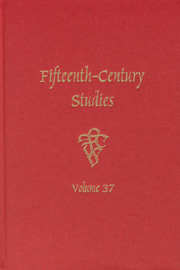Book contents
- Frontmatter
- Contents
- Essays
- Tradition and Innovation in 15th and 16th Century Popular Song Poetry: From Oswald von Wolkenstein to George Forster
- The Poet at the Mirror: René d'Anjou and Authorial Doubling in the Livre du Cœur d'Amour épris
- Modern Translator or Medieval Moralist?: William Caxton and Aesop
- A Battle of “Trechour Tung[s]”: Gaelic, Middle Scots, and the Question of Ethnicity in the Scottish Flyting
- Wheels and Wycliffites: The Role of Sacred Images in Capgrave's The Life of Saint Katherine
- Sympathy for the Devil: Gilles de Rais and His Modern Apologists
- Milieu, John Strecche, and the Gawain-Poet
- Thinking on Paper: Reference Tools, Tables, and Diagrams in Conrad Buitzruss's Compendium (Clm 671)
- Book Reviews
Modern Translator or Medieval Moralist?: William Caxton and Aesop
from Essays
Published online by Cambridge University Press: 05 February 2013
- Frontmatter
- Contents
- Essays
- Tradition and Innovation in 15th and 16th Century Popular Song Poetry: From Oswald von Wolkenstein to George Forster
- The Poet at the Mirror: René d'Anjou and Authorial Doubling in the Livre du Cœur d'Amour épris
- Modern Translator or Medieval Moralist?: William Caxton and Aesop
- A Battle of “Trechour Tung[s]”: Gaelic, Middle Scots, and the Question of Ethnicity in the Scottish Flyting
- Wheels and Wycliffites: The Role of Sacred Images in Capgrave's The Life of Saint Katherine
- Sympathy for the Devil: Gilles de Rais and His Modern Apologists
- Milieu, John Strecche, and the Gawain-Poet
- Thinking on Paper: Reference Tools, Tables, and Diagrams in Conrad Buitzruss's Compendium (Clm 671)
- Book Reviews
Summary
There is a fascinating scene from the Life of Aesop, as recounted in Julien Macho's late fifteenth-century Esope, in which King Xantus of Babylon requests that his servant Aesop go to the market and buy the best meat procurable for that evening's meal, which Xantus is hosting for a group of scholars visiting for a few days. Aesop returns soon thereafter with a basket of pork tongues. Upon seeing the tongues, the king insults Aesop, and he and the scholars angrily question the slave as to why he bought tongues when ordered to purchase the best meat. Justifying his choice of meats, Aesop replies:
[Q]uelle viande est milleure que la langue? [C]ar certainement tout art et toute doctrine et philozophie sont notifiees par la langue. Item, donner et prendre, sauluer et marchander et faire cités, toutes ces choses sont par la langue; car par la langue les hommes sont louez, car la vie des hommes mortelz, la plus grant partie, est en la langue, et ainsi n'est meilleur que la bonne langue ne chose plus doulce ne sauoreuse ne plus prouffitable es hommes mortelz.
The next day King Xantus again sends Aesop to the butcher, but this time, perhaps testing the servant, he requests that Aesop buy the worst (pire), most fetid (puante) meat. Again the slave returns with the tongues, and when Xantus and the scholars, indignant, demand to know why the fool has bought tongues again, Aesop explains:
[C]ar quelle chose est ce qui est pire ne plus puante que la mauluaise langue? Pour la langue les hommes sont perilz. Par la langue viennent en pourriture. Par la langue les cités sont destruictes, et de la mauluaise langue viennent tous maulx.
- Type
- Chapter
- Information
- Fifteenth-Century Studies 37 , pp. 47 - 70Publisher: Boydell & BrewerPrint publication year: 2012



